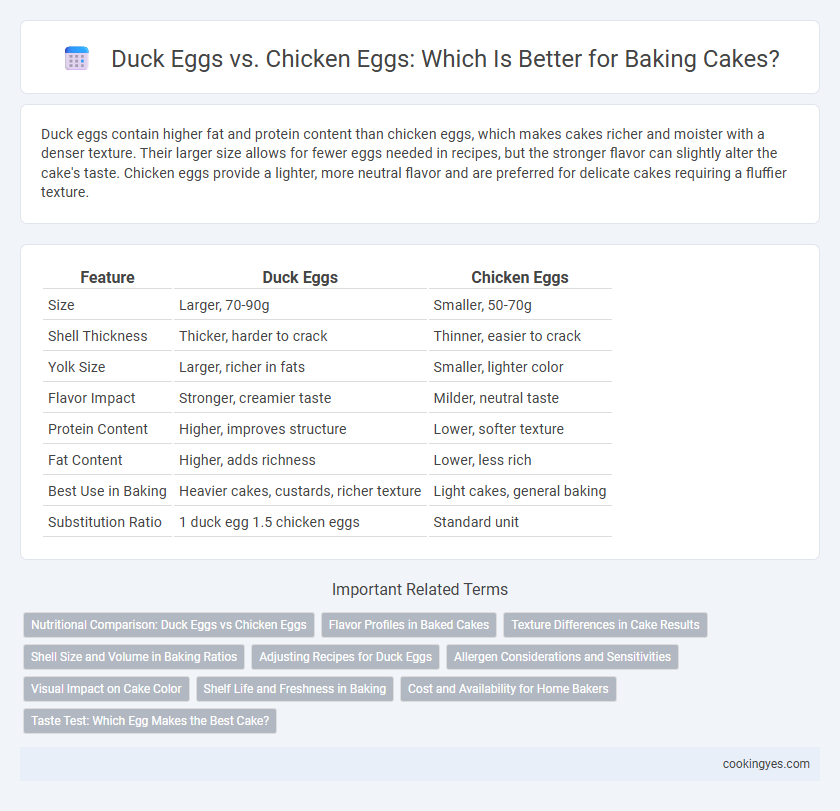Duck eggs contain higher fat and protein content than chicken eggs, which makes cakes richer and moister with a denser texture. Their larger size allows for fewer eggs needed in recipes, but the stronger flavor can slightly alter the cake's taste. Chicken eggs provide a lighter, more neutral flavor and are preferred for delicate cakes requiring a fluffier texture.
Table of Comparison
| Feature | Duck Eggs | Chicken Eggs |
|---|---|---|
| Size | Larger, 70-90g | Smaller, 50-70g |
| Shell Thickness | Thicker, harder to crack | Thinner, easier to crack |
| Yolk Size | Larger, richer in fats | Smaller, lighter color |
| Flavor Impact | Stronger, creamier taste | Milder, neutral taste |
| Protein Content | Higher, improves structure | Lower, softer texture |
| Fat Content | Higher, adds richness | Lower, less rich |
| Best Use in Baking | Heavier cakes, custards, richer texture | Light cakes, general baking |
| Substitution Ratio | 1 duck egg 1.5 chicken eggs | Standard unit |
Nutritional Comparison: Duck Eggs vs Chicken Eggs
Duck eggs contain higher protein, fat, and cholesterol levels compared to chicken eggs, contributing to richer and moister baked goods. The larger size of duck eggs provides more volume per egg, which can affect the texture and density of cakes. Vitamins such as B12 and minerals like iron are more abundant in duck eggs, enhancing the nutritional value of baked products.
Flavor Profiles in Baked Cakes
Duck eggs have a richer, creamier flavor compared to chicken eggs, contributing to moist and tender cakes with a slightly more robust taste. The higher fat content in duck eggs enhances the depth of flavor, making baked goods more flavorful and dense. Chicken eggs provide a milder, more neutral taste, allowing other ingredients to shine without overpowering the cake's overall profile.
Texture Differences in Cake Results
Duck eggs provide a richer texture in cakes due to their higher fat and protein content compared to chicken eggs, resulting in a denser and moister crumb. The increased yolk size in duck eggs enhances smoothness and adds a creamy mouthfeel that can improve flavor depth. Cakes made with chicken eggs tend to be lighter and airier, offering a more delicate crumb ideal for softer baked goods.
Shell Size and Volume in Baking Ratios
Duck eggs typically have larger shells and greater volume compared to chicken eggs, influencing baking ratios in cake recipes. The average duck egg weighs about 70 grams, nearly 50% more than a standard chicken egg, which weighs around 50 grams. Adjusting recipes by volume or weight ensures proper texture and structure in cakes when substituting duck eggs for chicken eggs.
Adjusting Recipes for Duck Eggs
Duck eggs contain higher fat and protein content compared to chicken eggs, which can affect the texture and moisture of baked cakes. When substituting duck eggs in recipes designed for chicken eggs, reduce the amount of fat or liquid slightly to maintain the desired consistency and avoid overly dense results. Adjust baking times as duck eggs may cause cakes to bake more slowly due to their richer composition.
Allergen Considerations and Sensitivities
Duck eggs contain higher protein and fat levels compared to chicken eggs, which can alter cake texture and richness but may also increase allergenic potential for sensitive individuals. Those allergic to chicken eggs might tolerate duck eggs, yet cross-reactivity is common, necessitating caution. Baking recipes can require adjustments in moisture and leavening due to the larger size and composition differences of duck eggs.
Visual Impact on Cake Color
Duck eggs create a richer and more vibrant yellow color in cakes compared to chicken eggs due to their higher yolk content and pigment concentration. The increased fat and protein levels in duck eggs contribute to a denser crumb and deeper golden hue, enhancing the cake's visual appeal. Bakers seeking a strikingly bright and moist cake often prefer duck eggs for their superior color intensity.
Shelf Life and Freshness in Baking
Duck eggs offer a longer shelf life compared to chicken eggs, typically lasting up to 7 weeks when stored properly, while chicken eggs remain fresh for about 3 to 5 weeks. The thicker shells and higher protein content in duck eggs contribute to better freshness retention, which enhances moisture and structure in baked cakes. Choosing duck eggs can improve cake texture and stability due to their superior freshness and durability during storage.
Cost and Availability for Home Bakers
Duck eggs typically cost more than chicken eggs due to their larger size and lower production volume, making them less commonly available in regular grocery stores. Chicken eggs are widely accessible and budget-friendly, making them the preferred choice for most home bakers seeking consistent supply and affordability. In baking cakes, the higher price and limited availability of duck eggs can be a deterrent despite their richer composition.
Taste Test: Which Egg Makes the Best Cake?
Duck eggs produce richer, moister cakes with a slightly creamier texture due to their higher fat and protein content compared to chicken eggs. Taste tests often reveal duck egg cakes have a more pronounced flavor and better rise, enhancing overall cake quality. Bakers seeking denser, more flavorful cakes typically prefer duck eggs, while chicken eggs offer a lighter, classic taste suitable for delicate recipes.
Duck eggs vs Chicken eggs for baking cakes Infographic

 cookingyes.com
cookingyes.com